

ABCs of Brain-Based Learning. Resources and Downloads to Facilitate Inquiry-Based Learning. A Case for Curiosity: Hear from one educator on the value of asking “why?”
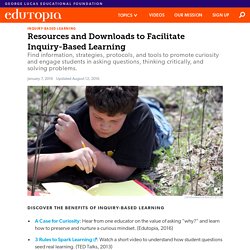
The School Learning Commons Knowledge Building Center. Teach Students to Ask Their Own Questions. This process explicitly validates all students’ intellectual abilities.– High School History Teacher, New York The reasons behind their questions often bowl me over with their sincerity, the fact that [they] really want to know the answers because it’s important to them, or they feel it would be important for others to know.– 4th Grade Teacher, Chicago The ability to produce questions, improve questions and prioritize questions may be one of the most important—yet too often overlooked—skills that a student can acquire in their formal education.
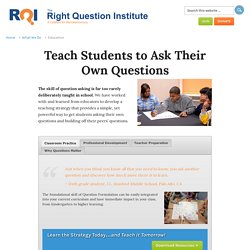
Strong critical thinking is often grounded in the questions we ask. By deliberately teaching questioning skills, we will be facilitating a process that will help students develop a mental muscle necessary for deeper learning, creativity and innovation, analysis, and problem solving. Join the Movement: Make Question Formulation a part of Every Child’s EducationGet Involved » Are We Asking the Right Questions.
What Is The Purpose Of A Question? - Inquiry Based Learning - Dos and Don'ts. About ETR Community EdTechReview (ETR) is a community of and for everyone involved in education technology to connect and collaborate both online and offline to discover, learn, utilize and share about the best ways technology can improve learning, teaching, and leading in the 21st century.
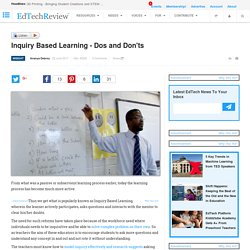
Critical Thinking. Promoting Student-Directed Inquiry with the I-Search Paper. Our lesson plans are written and reviewed by educators using current research and the best instructional practices and are aligned to state and national standards.
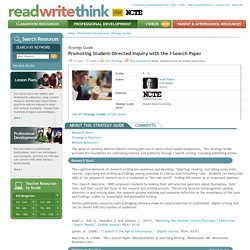
Inquiry - TeachThought PD - One Day Workshop. One Day Workshop We take a deep look at the International Society of Technology in Education (ISTE) Student, Teacher, and Coaches standards for Educational Technology.
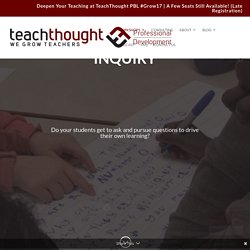
We translate the broad views of the standards into pedagogic practice and curricular development in a way that highlights inquiry in learning and cross-content skill development. The School Learning Commons Knowledge Building Center. Teaching Strategy: Four Corners. Questioning; Challenge & Engagement. Questioning is a fundamental element of pedagogy, one you could read endlessly around, but the reality is using questioning to challenge and engage all learners is demanding and potentially problematic to get right.
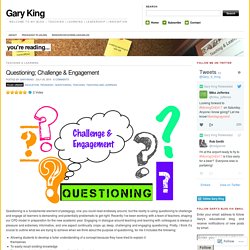
Recently I’ve been working with a team of teachers, shaping our CPD model in preparation for the new academic year. Engaging in dialogue around teaching and learning with colleagues is always a pleasure and extremely informative, and one aspect continually crops up; deep, challenging and engaging questioning. Firstly, I think it’s crucial to outline what we are trying to achieve when we think about the purpose of questioning, for me it includes the following: Making the assumption that we are all familiar with Blooms Taxonomy; a cognitive approach to to classify forms and levels of learning, research has shown that as teachers we tend to ask questions in the “knowledge” category 80% to 90% of the time.
Active engagement Good luck with your questioning! Like this: Engaging Students Through Effective Questions. Good teaching is more a giving of right questions than a giving of right answers. - Josef Albers (1888-1976) My youngest son Robbie, aged 12, often asks thought-provoking questions.
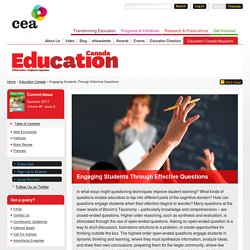
Every few days he surprises me with a topic that seems to come out of the blue. Costa's Levels of Inquiry. Busting 5 Myths of Inquiry-Based Learning #HackingPBL - Cooper on Curriculum. Inquiry-Based Learning - The Power of Asking the Right Questions. As a fourth-grade teacher at an inquiry-based learning school, I've come to understand the importance of planning. Planning is critical and also best practice. I still plan at the beginning of each week and each day. How Do You Create A Culture of Inquiry? As students enter classrooms for the beginning of a new school year, the rally cry from business leaders, university professors, and policy makers is for a K-12 experience that develops more critical thinkers.
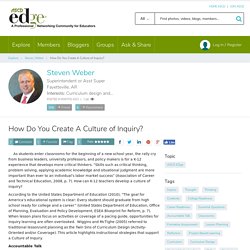
“Skills such as critical thinking, problem solving, applying academic knowledge and situational judgment are more important than ever to an individual’s labor market success” (Association of Career and Technical Education, 2008, p. 7). How can K-12 teachers develop a culture of inquiry? According to the United States Department of Education (2010), “The goal for America’s educational system is clear: Every student should graduate from high school ready for college and a career” (United States Department of Education, Office of Planning, Evaluation and Policy Development, ESEA Blueprint for Reform, p. 7).
Creating a Culture of Inquiry. Inquiry is powerful. It can create student ownership in the classroom. Inquiry-based Learning: Explanation. What is inquiry-based learning?
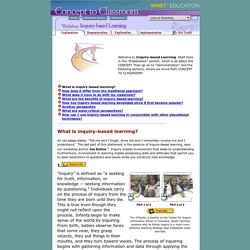
An old adage states: "Tell me and I forget, show me and I remember, involve me and I understand. " The last part of this statement is the essence of inquiry-based learning, says our workshop author Joe Exline 1. Inquiry implies involvement that leads to understanding. What is Inquiry Based Learning? How to Study Help students learn to study well.
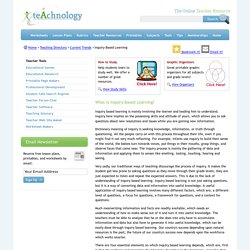
We offer a number of great resources. View Study Skills. Internet Catalogue. The Questioning Toolkit - Revised. The first version of the Questioning Toolkit was published in November of 1997. Since then there has been substantial revision of its major question types and how they may function as an interwoven system.
This article takes the model quite a few steps further, explaining more about each type of question and how it might support the overall investigative process in combination with the other types. photo ©istockphoto.com. Prewriting (Invention) Summary: This section explains the prewriting (invention) stage of the composing process. It includes processes, strategies, and questions to help you begin to write. Many, Many Examples Of Essential Questions. Many, Many Examples Of Essential Questions by Terry Heick Essential questions are, ask Grant Wiggins defines, “‘essential’ in the sense of signaling genuine, important and necessarily-ongoing inquiries.” These are grapple-worthy, substantive questions that not only require wrestling with, but are worth wrestling with–that could lead students to some critical insight in a 40/40/40-rule sense of the term. Inquiry Learning and Reading Comprehension Strategy Instruction: Processes That Go.
How to Bring ‘More Beautiful’ Questions Back to School. In the age of information, factual answers are easy to find. Want to know who signed the Declaration of Independence? Google it. Curious about the plot of Nathaniel Hawthorne’s famous novel, “The Scarlet Letter”? The Great Question Press. Express 7.13 - Sharing the Power of the Question. Fostering Student Questions: Strategies for Inquiry-Based Learning. Ramsey Musallam’s TED Talk on his "3 Rules to Spark Learning" inspires the need to foster students' curiosity.
Bringing Inquiry-Based Learning Into Your Class. In the shallow end of the Types of Student Inquiry pool, Structured Inquiry gives the teacher control of the essential question, the starting point—for example, “What defines a culture?” Or “What is the importance of the scientific method?” These questions are not answered in a single lesson and do not have a single answer, and, in fact, our understanding of an essential question may change over time as we research it. In Structured Inquiry, the teacher also controls specific learning activities, the resources students will use to create understanding, and the summative assessment learners will complete to demonstrate their understanding.
In Controlled Inquiry, the teacher provides several essential questions. Learners unpack several resources predetermined by the teacher to provide valuable context and rich meaning relative to the essential questions. What the Heck Is Inquiry-Based Learning? Chapter Four - Curiosity. Order McKenzie books online with a credit card Bring Jamie to your school or district for a great workshop. Question Families. Connecting the Dots. Inquiry-Based Learning: Developing Student-Driven Questions. Writing Our Way Into Inquiry and Presearch - DML Central. Harvard Education Publishing Group. Students in Hayley Dupuy’s sixth-grade science class at the Jane Lathrop Stanford Middle School in Palo Alto, Calif., are beginning a unit on plate tectonics. The importance of surprise. Great Research. Nudging Toward Inquiry (AASL 2009) Resources and Downloads to Facilitate Inquiry-Based Learning.
4 Phases of Inquiry-Based Learning: A Guide For Teachers. 5 Ways to Help Your Students Become Better Questioners. 10 Tips For Launching An Inquiry-Based Classroom. May From Now On. A Brilliant Question. Are Your Seniors Ready for College, Career, and Civic Life? – School Library Connection Blog. FILLING THE TOOL BOX. Useful Tips on Writing Essential Questions. Chronicling America « Library of Congress.